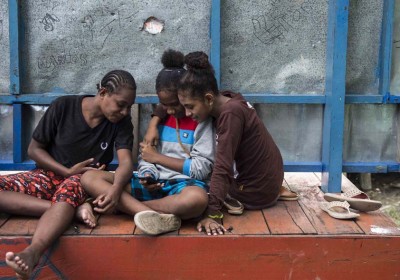Heading to the IDF 2018: Potential of Digital Economy for Driving Regional Development
July 07, 2018
The children are using communication devices in Agats, Asmat regency, Papua, Saturday (27/1). The government is targeting the construction of Base Transceiver Station (BTS) tower for high speed internet connection to be completed in 2019 in 180 districts in 12 provinces, some of them are Maluku, North Maluku, East Nusa Tenggara and West Papua. (antarafoto)
Across the world, rapid growth of digital economy changes the order of business, government and society. Nowadays, various services, jobs and social and education activities are available online. Digital economy significantly contributes economic growth, facilitates trade, creates new jobs and economic opportunities as well as enables for business expansion.
The use of smartphone and internet is commonplace in Indonesia and e-commerce grows quickly. Online business sale rises 40% each year. The central and regional administrations embrace technology and more public services provide online services.
These various developments offer chances to drive digital economy at local level as a way to support regional growth and development. Digital technology is able to help overcoming some of distance and infrastructure-related matters in regions where they find physical access to market as significant obstacle.
However, Indonesia faces a number of challenges in expanding the country’s digital economy, some of them are: unequal spread of infrastructure and human resources to assist digital economy; discrepancy on the availability and the capacity to utilize information and communication technology; and lack of integrated partnership among stakeholders and policy makers to push digital economy.
In response to the challenges, a number of researchers will discuss their outcomes on ways that can be taken by Indonesia to support the potentials of the digital economy. Technology development can encourage economic growth at national, regional or local levels.
Lutfia Aisya from PT Tani Hub Indonesia explains the impacts of digital innovations for rural agriculture in her paper titled “Assessing impact of digital innovation in rural agriculture: A case study on TaniGroup”. The examined digital innovation in the research is TaniHub and TaniFund. These two applications are able to have fixed major problems faced by farmers in finance and market sectors.
She finds that the applications are able to have added agricultural practices and businesses in rural areas. In addition to saying that, Lutfia suggests the government providing communication infrastructure supporting tools across Indonesia hence the applications are accessible from remote parts of the country.
Besides farmers, overall poor people are given solutions to access digital economy. Margareta Wahyu Catur Wijayanti, economy and family economy resilience expert of Wahana Visi Indonesia Foundation, elaborates her research titled “ASKA and ASKA Application, Empowering Saving-and-Loan Public Method for the Poor”.
In her paper, Margareta says on the efforts from the Foundation to develop saving-and-loan groups based on ASKA model. ASKA is the abbreviation of Asosiasi Kelompok Simpan Pinjam untuk Kesejahteraan Anak or Association of Saving-and-Loan for Children Welfare. The groups are provided with Android-based application. According to focused monitoring and discussion, the ASKA model is proven to have served as the learning facility for the poor to start saving, become disciplined in managing their money, shape them becoming good borrowers and change their attitudes in spending money.
As time goes by, the amount of groups and members of ASKA grow from year to year. The number of ASKA group is 60 in 2015 then becomes 122 in 2017. The amount of the members also grows, from 1,214 people in 2015 to 2,614 persons in 2017. The value of the saving of the poor is US$ 7,935 US$ (2015), US$ 111,729 (2016) then reaches US$ 138,814 US$ per 2017. The ASKA application overcomes problems in manual recording, builds transparent information system, becomes independent and notes financial transactions well.
Those type of solutions are worthy of knowing by the public through Indonesia Development Forum 2018 to be held 10-11 July 2018. IDF 2018 takes a theme “Pathways to Tackle Regional Disparities across the Archipelago”. The forum is carried out by the National Development and Planning Agency or Bappenas and is supported by the Australian Government through Knowledge Sector Initiative (KSI). IDF 2018 drives accelerated development in Indonesia to be more equal and more sustainable based on knowledge, experience and fact. The result of the forum will be used to formulate Medium Term Development Plan 2020-2024.
Under sub-theme “Utilizing the Potential of Digital Economy for Pushing Regional Development”, Monitoring, Evaluation and Learning Advisor of the Public and Service Collaboration for Welfare, Valentine J Gandhi, explains his research titled “Potential for Blockchain Technology for Improving Village Level Data”.
Gandhi’s paper contains blockchain technology application to enhance data at village level, such as financial data, village information system and Biological Statistic and Civil Registration. Blockchain is a big book technology that serves as digital data basis. Blockchain increases recording efficiency and accuracy at village level. This technology is proven to have helped repairing village administration.
Aside the three papers, there are some other interesting materials on digital economy to be delivered at the IDF 2018. Next materials are from Nika Pratama, researcher of the Institution of the Study of Indonesia, titled “The Role of FinTech Digital Payments in Accelerating Development of Micro, Small and Medium Enterprises (MSMEs) in Indonesia: Empirical Evidence from West Nusa Tenggara and Bali”; Monica Yanuardani, student of psychology faculty of the Lund University, who writes “Exploring Talent Management Potential in Digital-Savvy SMEs: A Cluster Analysis from Jakarta, Bandung and Yogyakarta”; and Social System Lead Measy Angelina from United National Pulse Lab Jakarta, who writes “Banking on Fintech: what does it take for micro merchants to adopt them?**
Indonesia’s Research Institutions Supporting the Development of the Electric Vehicle Industry
Indonesian Muslim Fashion and Cosmetics IKMs Shine at Dubai World Expo 2020
Govt Steps Up UMKM Transformation Efforts in the Midst of Pandemic Slowdown
Govt Encourages Promotion of IKM Products in Digital Era
Government Begins Developing Maritime Training Center in Makassar
Tweets by IDDevForum
